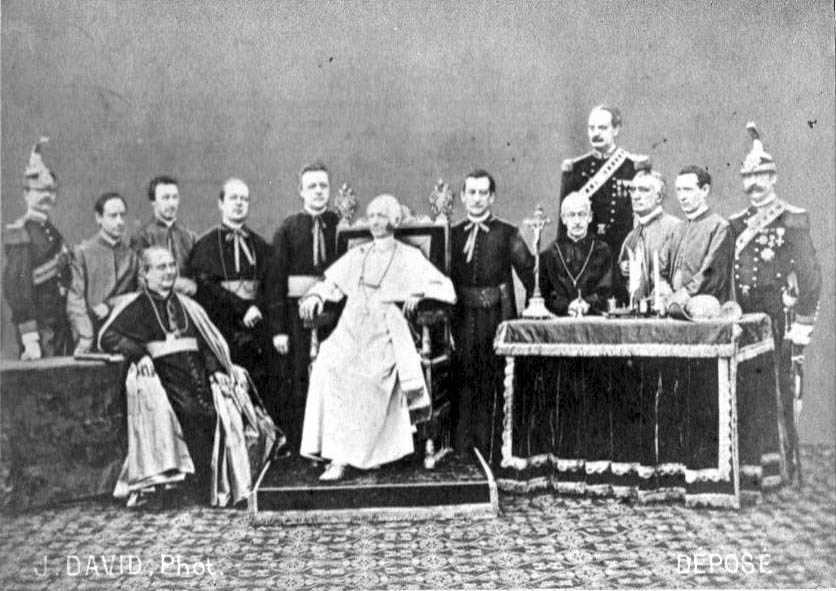
Pope Leo XIII (1810-1903), born Vincenzo Gioacchino Pecci, served as pope from 1878 to 1903 and is best known for his encyclical Rerum Novarum, which addressed social justice during the Industrial Revolution, alongside his efforts to modernize the Church and engage with the contemporary world.
Born Vincenzo Gioacchino Pecci on March 2, 1810, in Carpineto Romano, Italy, he became Pope Leo XIII on February 20, 1878, after a long career as a priest, diplomat, and bishop. His papacy, lasting until his death on July 20, 1903, spanned 25 years, making him one of the longest-serving popes in history.
Pecci studied theology and law, served as a papal diplomat in Belgium, and later became Archbishop of Perugia, where he gained a reputation for intellectual rigor and pastoral care. His experiences shaped his openness to modern challenges, setting the stage for his influential papacy.
Issued on May 15, 1891, Rerum Novarum addressed the plight of workers during the Industrial Revolution, advocating for fair wages, unions, and the dignity of labor while rejecting socialism and unchecked capitalism. This encyclical marked a turning point, establishing Leo XIII as the architect of modern Catholic social teaching and earning him lasting recognition.
Leo XIII wrote over 80 encyclicals, including Aeterni Patris (1879), which revived Thomism—the philosophy of Thomas Aquinas—as a cornerstone of Catholic thought, and Providentissimus Deus (1893), promoting biblical scholarship. These works showcased his intellectual vigor and desire to align the Church with reason and modernity.
Unlike his predecessor Pius IX, who resisted secularism, Leo XIII sought dialogue with contemporary society, encouraging Catholics to engage in politics and intellectual life. He opened Vatican archives to scholars, fostered relations with nations like France, and embraced scientific inquiry, earning him the nickname “Pope of the Rosary” for his spiritual outreach amid modernization.
Leo XIII navigated a tense era of secularization, advocating for the Church’s independence from state control while urging Catholics to participate in democratic societies. In Immortale Dei (1885), he argued that governments should respect religious freedom, a pragmatic stance that balanced tradition with the realities of a changing world.
Through Aeterni Patris, Leo XIII revitalized Catholic philosophy by promoting Thomism, encouraging seminaries and universities to adopt Aquinas’ methods of reconciling faith and reason. This move strengthened Catholic intellectual life, influencing education for generations and shaping thinkers like Jacques Maritain.
Rerum Novarum laid the groundwork for Catholic social teaching, inspiring later popes like Pius XI and John Paul II to address labor and economic justice. It influenced Christian trade unions and social movements worldwide, cementing Leo XIII’s reputation as a champion of the working class. His vision of a moral economy—balancing property rights with the common good—remains a touchstone for addressing inequality. Beyond labor, his broader writings emphasized human dignity in all aspects of life.
Leo XIII promoted devotion to the Rosary, issuing 11 encyclicals on it, including Supremi Apostolatus Officio (1883), to foster prayer amid secular challenges. He also composed the St. Michael the Archangel prayer after a reported vision, reflecting his deep concern for spiritual warfare in a modernizing age. His efforts reinforced Catholic piety during a time of upheaval.
Pope Leo XIII is remembered as a bridge between tradition and modernity, steering the Church through the Industrial Age with intellectual openness and social concern. His encyclical Rerum Novarum remains a cornerstone of Catholic social doctrine, addressing timeless issues like labor rights and economic justice. His revival of Thomism reshaped Catholic philosophy and education, while his diplomatic efforts softened tensions with secular states. At age 93, he was the oldest pope to serve, leaving a legacy of adaptability and faith. His multifaceted contributions—social, intellectual, and spiritual—ensure his enduring relevance in Church history.